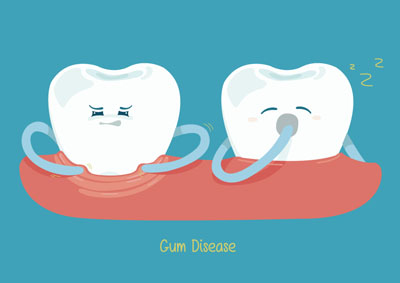Signs You Need to Visit a Periodontics Office
 Periodontics is the branch of dentistry that understands, diagnoses and treats the diseases that affect the supporting structures of your teeth. These supporting structures include your gums, periodontal membranes, alveolar bone and other areas of your jawbone. You may need to visit a periodontics office if you develop gum disease, are at high risk of gum disease, or suffer complications due to gum disease.
Periodontics is the branch of dentistry that understands, diagnoses and treats the diseases that affect the supporting structures of your teeth. These supporting structures include your gums, periodontal membranes, alveolar bone and other areas of your jawbone. You may need to visit a periodontics office if you develop gum disease, are at high risk of gum disease, or suffer complications due to gum disease.
What is gum disease?
Gum disease, the most serious form of periodontal disease, is an infection that affects the supporting dental structure. Gum disease is the primary cause of tooth loss among adults, and it occurs in most adults. According to the CDC (Centers for Disease Control and Prevention), periodontal disease occurs in nearly 50 percent of adults. Once adults are 65-years-old, that percentage increases to 70 percent.
Gum disease occurs due to the buildup of bacteria and plaque along the edge of your gum line. Plaque eventually hardens into tartar and cannot be removed without the help of a dentist or periodontics office. If gum disease is not treated or stopped in its early stages, it develops into the more severe periodontal disease, characterized by the chronic inflammatory response of the gum tissues and supporting bone structure of your teeth. Symptoms of gum disease include periodontal pockets (gum pulls away from teeth, creating pockets), gum recession, loose teeth, exposed roots, gum inflammation and bleeding, and discomfort.
If this sounds familiar to you, you should visit a periodontics office immediately to reduce your risk of losing teeth and needing oral surgery.
Signs you need to visit a periodontics office
It is crucial to visit a periodontics office if:
- Gum disease runs in the family
- The patient is pregnant (women who are pregnant are more susceptible to gum disease due to an increase in natural bacteria)
- The gums are swollen, red and bleed when one brushes or flosses
- The patient notices that his or her breath is constantly foul-smelling, even after brushing
- The patient has a constant metallic taste in the mouth
- The gums are receding, showing more of the tooth
- There are pockets between the teeth and gums
- The teeth feel loose or like they are shifting in alignment
- One notices a weakness when chewing
- It is uncomfortable to eat
- The teeth are extra-sensitive to hot and cold temperatures
- An individual smokes or chews tobacco
- One has night grinding habits
- Once has diabetes, which results in higher levels of sugar in saliva
These signs that one needs to visit a periodontics office need to be taken seriously. Even if one does not have gum disease, there may be another dental structure issue that needs treatment. The American Academy of Periodontology recommends patients receive an all-inclusive periodontal evaluation from a dentist or periodontics office once a year. With the annual evaluation, the patient can ensure a periodontal disease does not develop because it was unnoticed in the beginning stages. If one develops gum disease, we can help fight it by providing the necessary periodontics treatment options.
Recent Posts
If you have ever had trouble with your gums, you may have seen a dentist with experience in periodontics. It is the treatment of disease that affects the gums and other structures around your teeth.Dentists who study periodontics have comprehensive training in diagnosing, treating, and preventing gum disease. They spend three additional years in school…
The structures supporting teeth need proper care, or they will become infected and damage the teeth.With such a focus on cleaning the visible surface of the teeth, it can be easy for people to forget about the structure of their teeth. You may not even realize that the structure of the teeth is just as…
Gum recession occurs when a person's gums are worn down or pushed back, leaving teeth roots exposed. The gums around a tooth might also recede if its position is abnormal. When a tooth's roots become exposed, the tooth has a higher risk of decaying, becoming infected and falling out. Gum recession is one of the…
While periodontitis may make you feel worried about your gums, your regular dentist will have the knowledge for basic routine periodontal treatments. They may even be able to carry these treatments out at their office.In the cases of advanced periodontal disease, other periodontal treatments may be necessary. Four of these possible treatments are listed below.This…